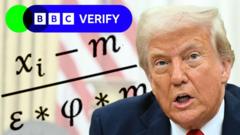President Trump's sweeping new tariffs, including substantial duties imposed on imports from significant trading partners, have sparked swift global backlash. Nations such as China and European states threaten countermeasures as stock markets plummet in response to the economic turmoil.
Global Markets Reeling from Trump’s Aggressive Tariffs

Global Markets Reeling from Trump’s Aggressive Tariffs
Countries worldwide react to President Trump's newly imposed tariffs with sharp declines in markets and warnings of retaliation.
April 3, 2025, has marked a significant turning point in international trade as President Trump unveiled a series of steep tariffs on imports from numerous countries, igniting a global economic shake-up. Instantaneous reactions flowed in from Asia and Europe, with executives and economists voicing concerns about the ramifications of this protectionist shift.
China responded with fiery criticism, labeling the tariffs “unilateral bullying” and promising counter-strategies to shield its economic interests. The Chinese Ministry of Commerce highlighted the measures as provocative and expressed intent to safeguard “its own rights.” Meanwhile, in Brussels, European Commission President Ursula von der Leyen articulated a collective stance from the EU, vowing “proportional and robust” counter-responses.
Japan, traditionally a close ally, adopted a more measured approach, with Prime Minister Shigeru Ishiba expressing regret but steering clear of retaliatory threats. The tariffs affected Japan's essential exports significantly, notably in the automobile sector.
On Wall Street, futures plummeted post-announcement, with the S&P 500 experiencing a drop of over 3%, mirroring substantial declines across major Asian and European indices. Markets were unprepared for the magnitude of the tariffs, with investors scrambling to interpret the long-term implications.
The tariffs included a staggering 34% on goods from China, alongside 20% for the European Union and various rates for other trading partners. Experts cautioned that U.S. consumers might bear the brunt of rising product costs due to these measures, with forecasts of inflation looming as the economy adjusts.
Trade experts and political figures worldwide voiced fears that President Trump’s decisions could trigger retaliatory measures, possibly escalating into an extensive trade war. Varied responses emerged globally, with some countries like Brazil already contemplating retaliatory tariffs.
Germany and other nations dependent on exports are bracing themselves for significant disruptions, with local officials echoing the necessity for a united European front against what they termed as an unprecedented trade attack. Meanwhile, the fallout extends to smaller industries in places like Bangladesh and Cambodia, struggling under sudden hikes in tariffs on goods crucial to their economies.
As the dust settles on this unpredictable trade landscape, the global economic community continues to monitor developments closely, anticipating moves that could reshape international market dynamics in the months to come. The implications reach beyond immediate financial markets, promising uncertainty for long-term trade relations.
China responded with fiery criticism, labeling the tariffs “unilateral bullying” and promising counter-strategies to shield its economic interests. The Chinese Ministry of Commerce highlighted the measures as provocative and expressed intent to safeguard “its own rights.” Meanwhile, in Brussels, European Commission President Ursula von der Leyen articulated a collective stance from the EU, vowing “proportional and robust” counter-responses.
Japan, traditionally a close ally, adopted a more measured approach, with Prime Minister Shigeru Ishiba expressing regret but steering clear of retaliatory threats. The tariffs affected Japan's essential exports significantly, notably in the automobile sector.
On Wall Street, futures plummeted post-announcement, with the S&P 500 experiencing a drop of over 3%, mirroring substantial declines across major Asian and European indices. Markets were unprepared for the magnitude of the tariffs, with investors scrambling to interpret the long-term implications.
The tariffs included a staggering 34% on goods from China, alongside 20% for the European Union and various rates for other trading partners. Experts cautioned that U.S. consumers might bear the brunt of rising product costs due to these measures, with forecasts of inflation looming as the economy adjusts.
Trade experts and political figures worldwide voiced fears that President Trump’s decisions could trigger retaliatory measures, possibly escalating into an extensive trade war. Varied responses emerged globally, with some countries like Brazil already contemplating retaliatory tariffs.
Germany and other nations dependent on exports are bracing themselves for significant disruptions, with local officials echoing the necessity for a united European front against what they termed as an unprecedented trade attack. Meanwhile, the fallout extends to smaller industries in places like Bangladesh and Cambodia, struggling under sudden hikes in tariffs on goods crucial to their economies.
As the dust settles on this unpredictable trade landscape, the global economic community continues to monitor developments closely, anticipating moves that could reshape international market dynamics in the months to come. The implications reach beyond immediate financial markets, promising uncertainty for long-term trade relations.




















